
Redlining is a discriminatory practice in which services are withheld from potential customers who reside in neighborhoods classified as "hazardous" to investment; these neighborhoods have significant numbers of racial and ethnic minorities, and low-income residents. While the best-known examples involve denial of credit and insurance, also sometimes attributed to redlining, in many instances, are denial of healthcare and the development of food deserts in minority neighborhoods. In the case of retail businesses like supermarkets, the purposeful construction of stores impractically far away from targeted residents results in a redlining effect.

Grameen Bank is a microfinance organization and community development bank founded in Bangladesh. It makes small loans to the impoverished without requiring collateral.

Muhammad Yunus is a Bangladeshi social entrepreneur, banker, economist and civil society leader who was awarded the Nobel Peace Prize in 2006 for founding the Grameen Bank and pioneering the concepts of microcredit and microfinance. These loans are given to entrepreneurs too poor to qualify for traditional bank loans. Yunus and the Grameen Bank were jointly awarded the Nobel Peace Prize "for their efforts through microcredit to create economic and social development from below". The Norwegian Nobel Committee said that "lasting peace cannot be achieved unless large population groups find ways in which to break out of poverty" and that "across cultures and civilizations, Yunus and Grameen Bank have shown that even the poorest of the poor can work to bring about their own development". Yunus has received several other national and international honours. He received the United States Presidential Medal of Freedom in 2009 and the Congressional Gold Medal in 2010.
Gale Cincotta, a community activist from the Austin neighborhood of Chicago, led the national fight for the US federal Home Mortgage Disclosure Act (HMDA) of 1975 and the Community Reinvestment Act (CRA) of 1977. The CRA requires banks and savings and loans to offer credit throughout their entire market areas and prohibits them from targeting only wealthier neighborhoods with their lending and services, a practice known as redlining. She was a co-founder with Shel Trapp of the National People's Action in Chicago, a coalition of some 300 community organizations throughout the United States, and served as its executive director and chairperson from 1973 until her death in 2001.

The Community Reinvestment Act is a United States federal law designed to encourage commercial banks and savings associations to help meet the needs of borrowers in all segments of their communities, including low- and moderate-income neighborhoods. Congress passed the Act in 1977 to reduce discriminatory credit practices against low-income neighborhoods, a practice known as redlining.

Community development bank (CDB) or Community Development Financial Institution (CDFI) is a development bank or credit union that focus on serving people who have been locked out of the traditional financial systems such as the unbanked or underbanked in deprived local communities. They emphasize the long term development of communities and provide loans such as micro-finance or venture capital.
A community development financial institution (US) or community development finance institution (UK) - abbreviated in both cases to CDFI - is a financial institution that provides credit and financial services to underserved markets and populations, primarily in the USA but also in the UK. A CDFI may be a community development bank, a community development credit union (CDCU), a community development loan fund (CDLF), a community development venture capital fund (CDVC), a microenterprise development loan fund, or a community development corporation.
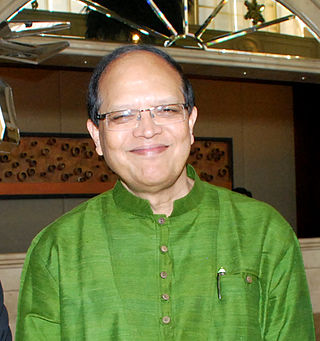
Atiur Rahman is a Bangladeshi development economist, author, and banker. He served as the 10th Governor of Bangladesh Bank, the central bank of Bangladesh. He has been called "the banker of the poor" for his contributions in developing the Bangladeshi economy. Rahman is credited with instituting changes in the banking industry that greatly increased the country's foreign exchange reserves and brought automation and digitization in the banking sector. Achievements during his tenure include the creation of the National Payment Switch; introducing automated check clearing for banks using local currency cheques; starting mobile banking; establishing the Bangladesh Electronic Funds Transfer Network (BEFTN); and installing the Bangladesh Automated Clearing House (BACH). On 15 March 2016, he resigned as central bank governor after the cyber hacking and theft of US$101 million in foreign reserves from the Bangladesh Bank account held at the Federal Reserve Bank of New York.
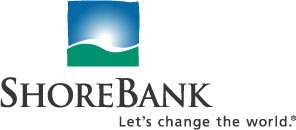
ShoreBank was a community development bank founded and headquartered in Chicago. At the time of its closing it was the oldest and largest such institution, and in 2008 had $2.6 billion in assets. It was owned by ShoreBank Corporation, a regulated bank holding company.
Wainwright Bank was an American socially progressive bank based in Boston. The bank was founded in 1987 and was acquired by Eastern Bank in 2010. While it operated it was lauded as a "rebel with a cause making its reputation as a champion of social-justice causes, throwing its support behind everything from the gay-rights movement and affordable housing initiatives to immigration reform and the anti-Iraq war movement."
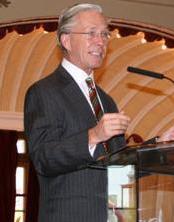
Joseph E. Hasten was the President and CEO of ShoreBank, America's first and leading community development and environmental bank founded in 1973 in Chicago, Illinois and named one of Fast Company's 45 Social Entrepreneurs Who Are Changing the World in 2008. Hasten led ShoreBank's socially responsible investing in the under-served urban neighborhoods of Chicago, Illinois; Cleveland, Ohio; and Detroit, Michigan. Previously, Hasten was the vice-chairman of U.S. Bancorp.

Eugene A. "Gene" Ludwig is an American business leader and expert on banking regulation, risk management, and fiscal policy. From 1993 to 1998 he served as Comptroller of the Currency.
Stanley James Hallett was an American urban planner and specialist in urban community development who helped seed numerous innovative initiatives and organizations throughout his career. With the bulk of his professional work taking place in Chicago, Hallett began by working in church civil rights and later turned increasingly toward community economic and environmental sustainability. He and colleagues together created Chicago's Center for Neighborhood Technology(CNT), South Shore Bank, Northwestern University's Center for Urban Affairs and Policy Research and other institutions. During his career he worked alongside numerous activists, journalists and religious leaders, including Martin Luther King Jr., Saul Alinsky, George McGovern and Studs Terkel.
Hipolito (Paul) Roldan, is an affordable housing developer in Chicago.
Mary Houghton is co-founder of ShoreBank, the largest and oldest community development bank. Houghton, along with Milton Davis, James Fletcher, and Ron Grzywinski purchased in 1973 what was then South Shore Bank to fight redlining in the Chicago neighborhood. She retired as president in May 2010.
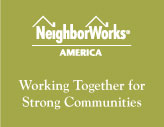
The Neighborhood Reinvestment Corporation, doing business as NeighborWorks America, is a congressionally chartered nonprofit organization that supports community development in the United States and Puerto Rico. The organization provides grants and technical assistance to more than 240 community development organizations. NeighborWorks America provides training for housing and community development professionals through its national training institutes. Since 2007, NeighborWorks America has administered the Congressionally created National Foreclosure Mitigation Counseling Program.
Richard Paul Taub was an American sociologist noted for his research on urban, rural, and community economic development. He was a faculty member of the University of Chicago's Department of Sociology and Department of Comparative Human Development and was also the Paul Klapper Professor in the Social Sciences.
Urban Partnership Bank was a Federal Deposit Insurance Corporation, full-service community development bank in the United States with $1.4 billion in assets. It was established on August 20, 2010 when it acquired the deposits and some of the assets of ShoreBank from the FDIC. It was headquartered in Chicago, Illinois. After chronic losses, it was acquired on Jan 30, 2019 by Providence Bank & Trust.
Dorothy Mae Richardson was an African American community activist who is credited with introducing a new model of community development in the late 1960s when she led a resident campaign for better housing in her neighborhood on the Central North Side of Pittsburgh, Pennsylvania.
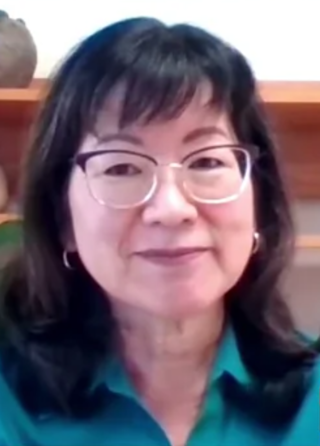
Nadine Kuniko Nakamura is an American politician and Democratic member of the Hawaii House of Representatives. She represents District 14, encompassing east and north Kaua`i, from Wailua to Haena. She won the seat after incumbent Democrat Derek Kawakami decided to run for a seat in the Kauai County Council. Nakamura won re-election in 2020 against Republican candidate Steve Monas, 76.2% to 23.8%.












